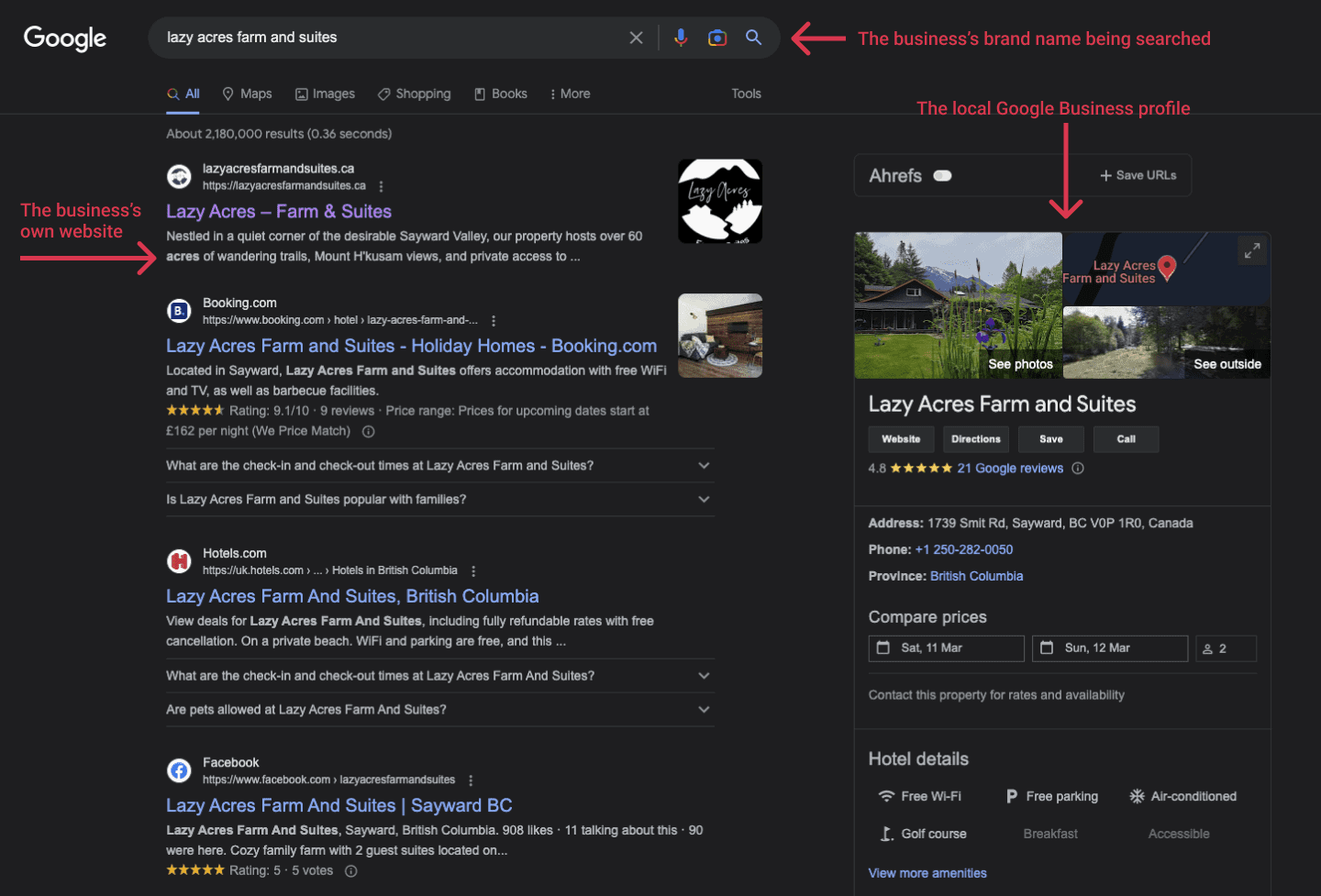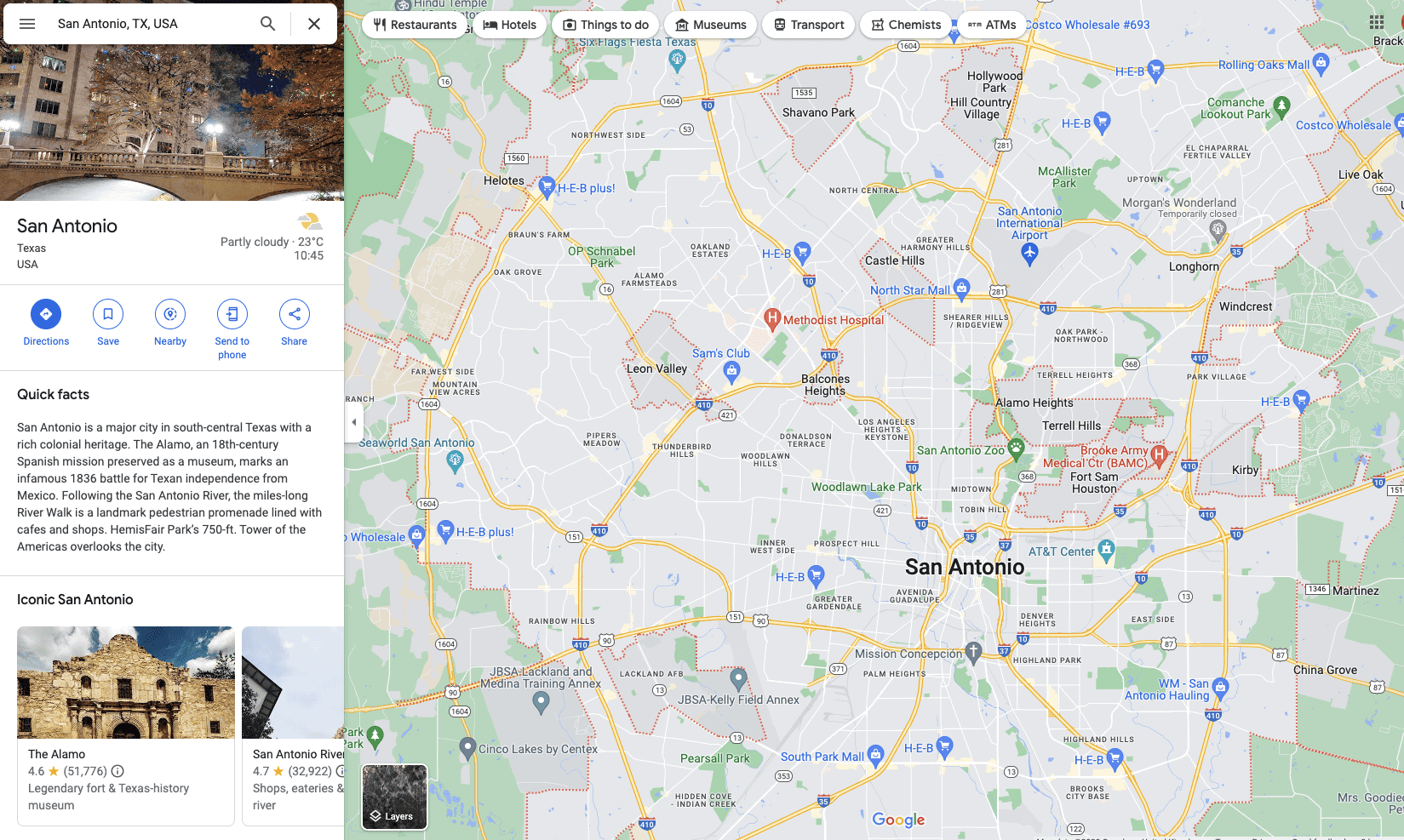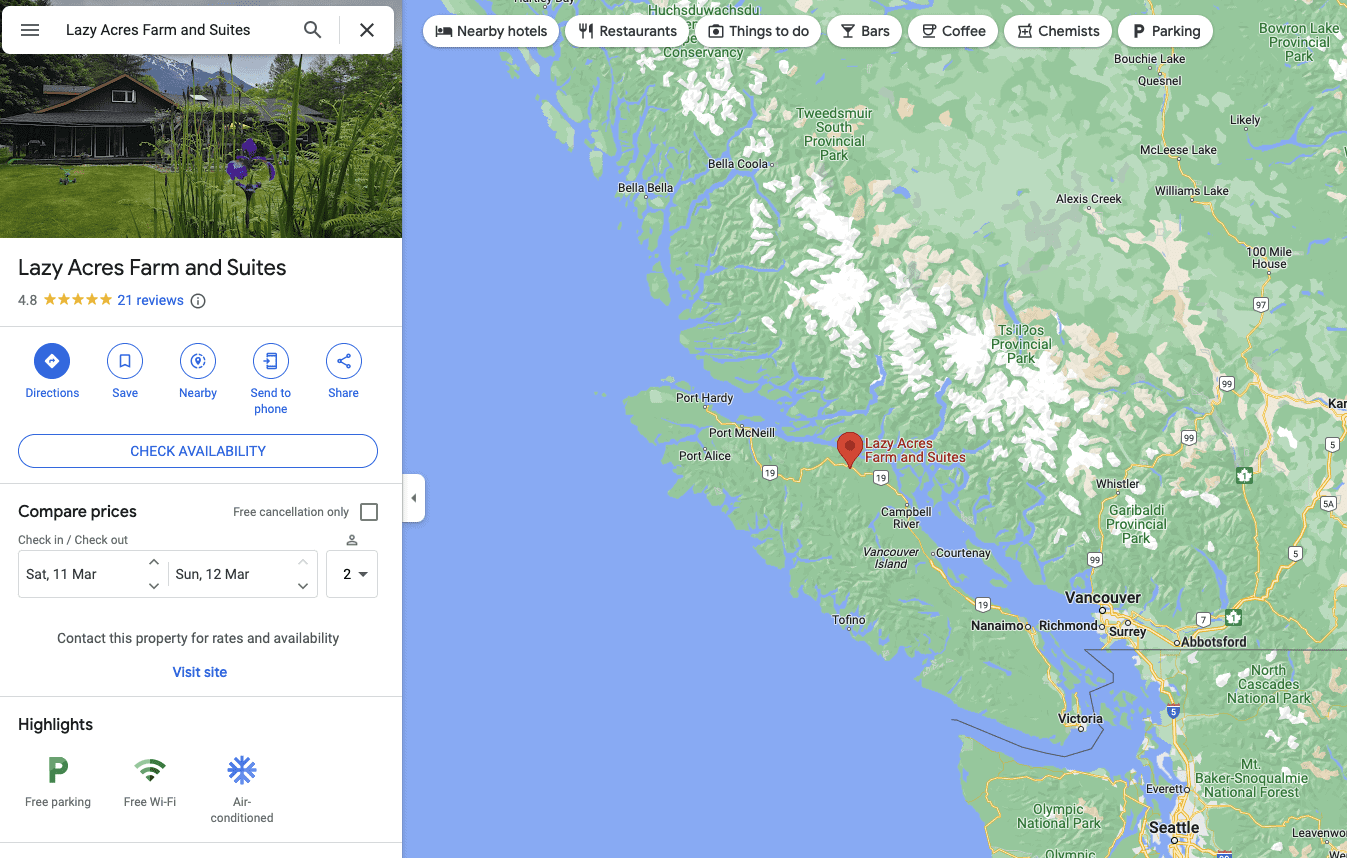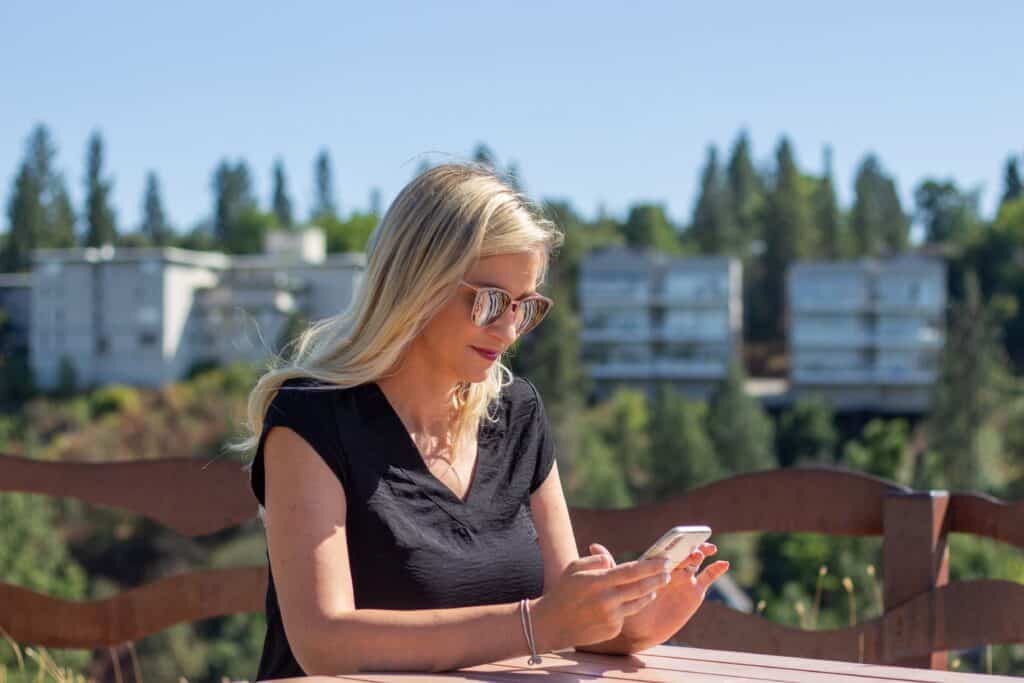SEO for hotels and other local independent accommodation businesses matters. The more visitors to your website, the higher your chances of commission-free direct bookings. As very few searchers scroll past the first page of search engine results, it’s vital you optimize your website to get noticed.
What does SEO stand for?: Search Engine Optimization. It’s about optimizing your B&B, vacation rental or hotel website so that it ranks highly on search engines such as Google, Bing, Yahoo and more.
If you create a useful and user-friendly online experience with everything laid out in simple black and white, you can’t go wrong — good SEO equals good business!
Let’s start with the SEO basics that all accommodation businesses should follow:
We recommend initially thinking about vacation rental and hotel SEO in 2 steps: branded vs non-branded searches.
1. Branded search
This relates to people who know your ‘brand’ and are searching for your business’s name directly (probably after finding you on a travel website like Expedia or Booking.com).
This gives you the best and easiest chance to get commission-free direct bookings, so prioritize this first.
Below is what you are aiming for the search engine to look like when people type your business name into Google/Bing/Yahoo:

You can do this by implementing the following:
- Become visible on all the major travel websites: take advantage of them to make sure people see you and then Google you. If no one knows you exist, no one will Google your business in the first place!
- Make sure you have a good URL. For example, if your property is called ‘Park House Farm’, you should go for a URL like parkhousefarm.com. Do not call yourself ‘theparkhouse’ or ‘thepark’. If the exact name isn’t available, add a location or add hyphens.
- Describe who you are and where you are in your content. You need to use your location (e.g. Park House Farm, Oregon).
2. Non-branded search
This relates to people who are searching for a place to stay in your area but don’t know who you are —yet. You need to make sure your property can be found depending on what phrase they are typing into the search engine. Below are some other factors Google will take into account:
- Your content should be relevant to you. Think of 2-3 phrases that best categorize your property and use them throughout your website, for example, ‘luxury vacation rental vancouver island’ or ‘self catering strathcona provincial park’. (Expert tip: Don’t pick highly competitive search terms like ‘vacation rentals in vancouver bc’. You need to be specific to beat the competition.) However, you still need to ensure that your content looks organic and not forced. Make sure you don’t ‘stuff’ lots of keywords at the bottom of your page.
- Use links to qualify your content. Google measures how many people link to your website as a sign of its quality. So if you use Tripadvisor, Facebook or Twitter, make sure they link to your website.
- Sign up for a Google Business Profile (formerly Google My Business) to appear in local and map listings. Google Maps is the third biggest search engine in the world, so being featured there can get you a lot of visitors.
3. Organize your site: Keep it simple
The first thing to bear in mind when you build your website is that it needs to be fast and user-friendly. Less definitely means more here.
So make sure that the website’s layout is appealing to the eye and that it’s easy for your customer to find what they want in as few clicks as possible.
Likewise, make sure the booking button is easy to find and the information on your site clear, so users don’t get frustrated and leave. People love to see what a property has to offer, so high-quality images of your rooms, outdoor areas and even some great shots of food will give them more reason to stay.
Don’t forget to include social buttons which link to your Facebook, Twitter or other social media accounts too! This makes it easy for users to share your pages with family and friends online, or follow your latest news and updates. (If you are looking to promote the quality of your menu, make sure you post as many pics on Instagram as possible to attract all your foodie fans.)
Tip: Here’s how you can easily add ‘Share’ or ‘Follow’ social media widgets to your website.
4. What are keywords and why are they important?
Keywords are types of words and phrases that people type into Google when searching — in this case, the terminology used to search for accommodation in your area. Looking at hotel SEO keywords that are relevant to your business will help you get a better grasp of what information you need to include and what to cover in your website content.
Carry out keyword research before you begin to write the content on your site. We recommend that you use a keyword research tool to ensure you are targeting the right keywords.
You need to get the attention of your audience and give them every reason to enjoy the time they spend on your website. For this reason, it’s vital to write all content in a natural and engaging manner. If you do that, you create a better online experience for your users, and Google will send more traffic your way!
5. How many keywords is too many?
It’s tempting to try to rank for as many keywords as possible. But you don’t want to get carried away and end up not ranking in the top positions for any hotel SEO keywords!
If you’re optimizing your website yourself, we recommend focusing on these keywords: your brand name (i.e. ‘Lazy Acres Farm’) and also 2 to 3 non-branded keywords that should include ‘[property type] in [specific location]’ and ‘[property type] near [tourist hot spots]’.
For example, non-branded keywords for a hotel in Dallas near some popular botanical gardens could be ‘hotels in downtown Dallas’, and ‘hotels near Dallas botanical gardens’. Make sure that the ‘locations/tourist hot spots’ you choose have enough search volume (i.e. enough people actually search for this hot spot for it be worthwhile as part of your keywords).
6. Make your site useful by incorporating hotel SEO best practices
It’s always helpful to include some interesting content on your website that relates to the surrounding area, as this gives potential guests more reason to come and visit.
For example, if your property is close to San Antonio, Texas, providing useful information on some of the best walks, food, museums and art in the area is going to help keep the user engaged.
Compile a list of all the questions a customer would have when they first visit your site, and write content that aims to answer them.
The more info you provide about every aspect of your business, the more trust you will build. Ensure any additional services and charges are clearly laid out so that your guests know exactly what they will be getting.

7. Use appropriate links
List and provide links to nearby attractions, restaurants and places of interest that visitors might enjoy. This encourages other local organizations to return the favor and link to you on their website.
Just be careful to link only to reputable sites, and make sure you get into the habit of periodically checking the links to ensure they’re still working — you don’t want to lead users to a webpage that doesn’t exist anymore!
8. Use meta tags and descriptions
Meta tags and descriptions are the information displayed when your property shows up in Google search results. They let users know that your page matches what they have searched for, and they’re key to quick wins for local hotel SEO.
The meta tag (or meta title) is essentially a short, snappy title (try sticking with less than 65 characters) that best describes the content on the page.
Meanwhile, the meta description is a brief summary of your page’s contents.
9. Optimize your site for multiple devices

In an age when we use our mobile and tablet devices for seemingly everything, it’s important to ensure your site can re-size and read well on whatever device someone is searching from. Google will rank you higher if it does!
If your site uses video, try uploading it in a format that can be read across all devices to guarantee maximum exposure. Consider that iPad and iPhone devices will not play certain kinds of videos.
You also want to make your website’s load speeds a priority. Your audience is likely to have a very short attention span. If your site is slow to load, they will move on to other websites.
If all this sounds a bit too technical for you, specialized platforms like eviivo Website Manager can help you create a responsive, visually attractive hotel or B&B website. Alternatively, you can find a more vacation rental-friendly website option here.
10. Will SEO for hotels replace using travel websites?
Absolutely not! Online Travel Agencies (OTAs) like Expedia, Booking.com and TripAdvisor have huge, global marketing budgets running into billions of dollars per year.
That means that searching sites like these will be how the majority of people find a hotel or vacation rental in any given area. If you’re not listing on these sites, you will be missing out — particularly if your competitors are!
11. Is SEO worth paying for?
We don’t recommend it for small 1-5 unit properties or where local search volume is relatively low. SEO for hotels, B&Bs and vacation rentals is relatively simple if you have new website builder tech; it takes care of a majority of the on-page hotel SEO work that’s most beneficial for small businesses.
Paying an ongoing fee for SEO services is typically reserved for work that gets you valuable backlinks to your website, which helps rankings for competitive locations and larger accommodation businesses. Expect to pay at least $500/month for anything worthwhile. At this price point, it’s probably only viable if you’re looking to grow substantially.
12. Ask for help
If you’re quite new to B&B, vacation rental and hotel SEO, or you’re not the strongest writer, you can still have a great website to promote your business. You don’t have to get a degree in art or web design, or break the bank by hiring agencies and designers to do it for you either. eviivo are here to help!
Learn more about our website builder designed specifically for vacation rentals, hotels & B&Bs. You get a website both users and Google will love, and which works seamlessly with our all-in-one booking and property management platform.



